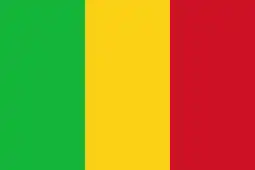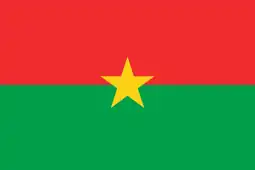The Ghana Immigration Service (GIS) is in charge of the removal and deportation of illegal immigrants in Ghana.[1][2]
The Ghanaian government has agreed to work with other Government and international agencies to prevent illegal immigration inside and outside the country.[3][4]
Terminology
Illegal immigration describes people entering a country without formal permission. There are many views on illegal immigration, depending on political standpoint:[5]
- illegal alien
- illegal immigrant
- clandestine workers
- sans papiers / "without papers"
- irregular immigrant/migrant/alien/worker/resident
- people "hiding/living/staying/working/ in the shadows"
- undocumented immigrant/migrant/alien/worker/resident
- unauthorized immigrant/migrant/alien/worker/resident
- paperless immigrant/migrant/alien/worker/resident
- immigrant "without immigration/legal status"
- out of status immigrant/migrant/alien/worker/resident
- unnaturalized immigrant/migrant/alien/worker/resident
- boat people
Many types of migrants are considered illegal immigrant, this includes those without any travel documents, refugee, runaway workers, workers working in different sectors than those stated in their work permit, overstay, fake travel documents, fake work permit, fake Ghana Card, fake UN Cards, stateless people as well as those born in Ghana by illegal immigrants.
Demographics
In 2010, it was estimated by the Ghanaian government that there were 3.1 million aliens and that the number of illegal immigrants was as high as 3.1 million in both South and North Ghana, including refugees. The nations home to the highest percentages of the illegal immigrant population were Nigeria, Burkina Faso, Mali, Togo, Ivory Coast, Benin, Liberia, Niger, and Cameroon.[6] From a little over 3,000,000 as at 1952/53 Ghana population had steadily grown to nearly 6,000,000 between 1957 and 1960 mainly through immigration at the time of the "Ghana Aliens Compliance Order" with foreigners alone forming over 20% of Ghana’s population in the 1960s.[7] By reason of reversal of frontier rules due to changes in government and deportation policies, Ghana in 2013 houses approximately 20 million inhabitants.[7] An overwhelming majority of beggars on the streets of Ghana in Accra, Kumasi, Tamale, Takoradi and the major Regional and District capitals are illegal immigrants.[8][7]
Source countries by types of activity
- Normal jobs (service, retail, mining etc.) -
 Nigeria,
Nigeria,  Benin,
Benin,  Ivory Coast,
Ivory Coast,  Togo, and
Togo, and  Liberia
Liberia - Beggars -
 Nigeria,
Nigeria,  Mali,
Mali,  Niger,
Niger,  Benin,
Benin,  Burkina Faso,
Burkina Faso,  Togo,
Togo,  Liberia, and
Liberia, and  Cameroon
Cameroon - Human trafficking/prostitution -
 Nigeria,
Nigeria,  Ivory Coast, and
Ivory Coast, and  Togo
Togo
Illegal Immigrants
Due to Ghana's emerging economy and rapidly developing standard of living; thousands of illegal immigrants have smuggled into Ghana to seek greener pastures.[9] In 2013, Ghana began the deportation of all illegal immigrants in Ghana for illegally engaging in the Ghana mining (galamsey), agriculture, and retailing industries; among other crimes.[9] Illegal immigrants and aliens in Ghana specifically concluded; 2.6 million Nigerian nationals,[10] 0.3 million Burkinabe nationals,[10] Togolese, Ivorians, Nigeriens, Malians; and mostly nationals from west Africa and elsewhere in Africa 0.2 million.[9]
Crackdown and Deportation
Ghana Aliens Compliance Order (GACO)
In 1969, under the "Ghana Aliens Compliance Order" (GACO) enacted by Ghanaian Prime Minister Kofi Abrefa Busia;[7] Nigerians and other African and non-African immigrants were forced to leave Ghana as they made up 20 percent of Ghana's population at the time,[7] and Ghana deported over 3 million Nigerians and other African and non-African immigrants in 3 months.[11] In April 2013, 120 foreign Chinese nationals were deported from Ghana for illegally engaging in mining and possessing false work permits.[12] More Chinese nationals have been deported since then.
References
- ↑ "Illegal immigrants". Ghana Broadcasting Corporation. Retrieved 2012-04-06.
- ↑ "40 Chinese immigrants arrested". The Chronicle. Archived from the original on 2012-07-11. Retrieved 2012-04-06.
- ↑ "Ghanaian Minister visit to INTERPOL focuses on ways to enhance cooperation". Interpol. Retrieved 2012-04-06.
- ↑ "Ghana: EU to Assist Government Combat Illegal Immigration". AllAfrica.com. Retrieved 2012-04-06.
- ↑ "illegal alien". Dictionary.com Unabridged. April 2011.
- ↑ "Undocumented Migrant & Refugee". FIDH. FIDH. Archived from the original on 5 June 2013. Retrieved 13 June 2013.
- 1 2 3 4 5 "Ghana Owes no Apology to Anybody for Aliens Compliance Order". vibeghana.com. 14 April 2013. Retrieved 13 June 2013.
- ↑ Holger, Weiss (2007). Research Report No. 133 (PDF). Stockholm, Sweden: Nordiska Afrikainstitutet. p. 180. ISBN 978-91-7106-598-8.
- 1 2 3 "Ghana To Deport Illegal Immigrants". peacefmonline.com. Archived from the original on 3 October 2013. Retrieved 13 June 2013.
- 1 2 "Foreigners in Ghana". ghanaweb.com. Retrieved 13 June 2013.
- ↑ "The History of Ghana's 1969 Aliens Compliance Order". davidson.edu. 29 March 2012. Archived from the original on 17 September 2013. Retrieved 13 June 2013.
- ↑ "Ghana to deport 120 Chinese for illegal mining". nydailynews.com. Daily News. Archived from the original on 17 April 2013. Retrieved 13 June 2013.